The Gift of South Dakota
Subscriptions to South Dakota Magazine make great gifts!
Subscribe today — 1 year (6 issues) is just $29!
Box Elder’s Good Eggs
By Ruth Steil
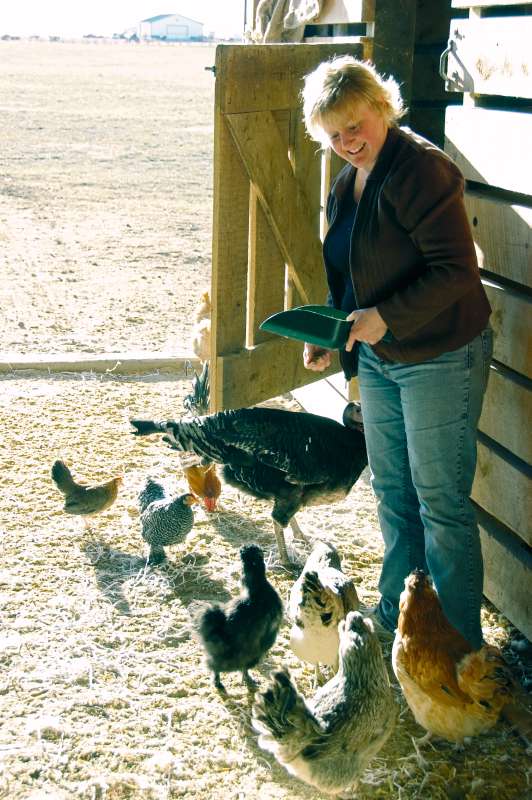 |
| Bolda's chickens range feed but she supplements their diet with an all-natural chicken food. |
Self-proclaimed “city chick” Sherri Bolda of Box Elder says that her fresh eggs are tastier and healthier than any supermarket egg. Her chickens are range fed to produce an egg that is low in bad cholesterol and has more Omega-3’s. The eggs are also organic because she doesn’t use antibiotics, pesticides or growth hormones.
Bolda came to South Dakota in 2002 from Virginia when her husband’s military career brought him to Ellsworth Air Force Base. “I cried all the way through the Badlands,” she says. “I missed the trees.” She didn’t learn to really appreciate South Dakota until two years later when they moved into the house they built on a 40-acre “mini-ranch” half way between Box Elder and New Underwood. “We have bluffs in back of the house and beautiful sunsets,” she says. The people of South Dakota helped win her over, too. She finds them to be “open, welcoming and laid back.”
Raised in Detroit, Bolda saw her first chicken while on a school field trip; she thought they were mean, dirty and had no personalities. Her opinion hadn’t changed over the years until a friend from her work at the Veterinary Treatment Facility at Ellsworth AFB convinced her otherwise. “She told me all about chickens, real chickens, not the white broiler birds that I’d seen as a kid from the city,” she says. “They actually had a personality and their eggs tasted so much better. Then she told me how long eggs stay in a warehouse before going to a store. Yuck!”
She started raising chickens as a hobby with five Araucanas she purchased from a local farm supply. Araucana chickens range in color from light to dark with osprey-like colored points. Their eggs can be blue, green or lavender—like Easter eggs without dye. Bolda later added other breeds including: Orpingtons, an excellent laying breed with a clown-like personality, Wyandottes, known for their extra large brown eggs and heavy feathering, and Dominiques, an old American breed from the eastern seaboard. She calls her flock City Chicks; by the spring of 2010, it numbered 125 birds of 15 different breeds.
For the first couple of years, Bolda named the majority of her chickens. She used all the MASH series’ names including Hawkeye and Hot Lips. One of her Orpingtons is called Cuddles, because she pecks at the back of Bolda’s leg until she’s picked up and cuddled.
The chickens reside in a 10 by 30 foot coop attached to the south side of a pole barn to protect it from the wind. Nests are lined with shredded paper and pine shavings. “There are roosts and beams so everyone has their own place,” says Bolda. “And we lean pallets against the wall so they don’t have foot infections and problems with their feet.”
Unless predators have been seen in the area, the flock has free access to the outside. “The coop has a door similar to a doggy door,” she says. “On nice days they go out and range feed.” This type of feeding has other benefits besides producing healthier eggs. “Last summer they did a wonderful job eating grasshoppers,” Bolda says. She does have to fence her garden—the chickens gobble up fresh vegetables, especially tomatoes.
Bolda feeds an all-natural chicken food and alfalfa cubes for treats. She collects and dries weeds in the summer for feeding during the winter. Last year’s sub-zero temperatures caused the hens to stop laying. On a visit to the feed store, she met an elderly woman who’d raised chickens since she was a girl. She gave Bolda a remedy—oatmeal mash. “It’s a mixture of oatmeal, quick dry oats, calf milk replacement, and leftover homemade applesauce and vegetables,” she says. “I gave this treat every few days and they went ga-ga over it.”
The flock isn’t all hens. Bolda has five roosters. They protect the flock, round the hens up at night and sound the alarm for hawks. “They take care of their girls,” she says.
“When I first got eggs I was a very proud mama,” Bolda says. “As a city girl I thought it was pretty cool.” She gathers eggs first thing in the morning and again in the evening. The 2010 flock laid an average of five to six dozen a day—too many for one family. “This started as a hobby and spread by word of mouth,” she says. “It’s still technically not a business.” She sells extra eggs to friends.
According to Bolda another benefit of her eggs is how they enhance baking and cooking. “Anything you use them in taste so much richer and better,” she says. “Cakes are fluffier due to the higher protein content of the eggs.” Her favorite egg recipes are simple—a sunny -side up egg or a fried egg sandwich.
Among the many things this “city chick” has learned since leaving the East Coast is that she won’t ever use a store bought egg again.
Editor’s Note: This story is revised from the March/April 2010 issue of South Dakota Magazine. To order a copy or to subscribe, call 800-456-5117. Sherri’s chickens fell victim to foxes in 2011. By October she was down to 18 hens, but hopes to rebuild the flock.
M.J. Adams of the Corn Exchange, a popular Rapid City restaurant that emphasizes the use of locally produced ingredients, shared the following egg recipe with us. “This is wonderful for a brunch, lunch or even for a light dinner. I serve it with a little arugula on the side that has been tossed lightly with olive oil and a little lemon juice and salt,” she says. “You can also replace the zucchini and pepper with any leftover vegetables you have in the fridge.”
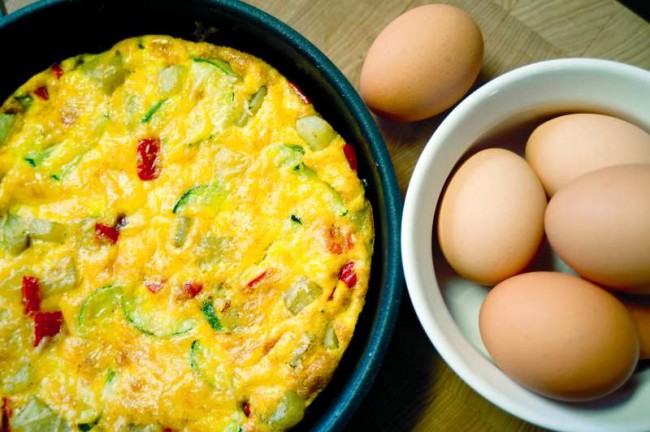 |
MJ’s Frittata
2 small potatoes, peeled and diced
1/2 red pepper cut same size as potatoes
1/2 small zucchini cut in half lengthwise then in half-moon shapes ½ inch thick
2 tablespoons olive oil
4 eggs
1 tablespoon milk
3 tablespoon goat cheese or any cheese such as parmesan, Swiss or cheddar (optional)
salt and pepper to taste
Preheat oven to 400 degrees. Heat olive oil in seven inch Teflon sauté pan. Add potatoes, season lightly with salt and pepper, toss gently and place in oven. Check potatoes in eight minutes, give them a toss then add zucchini and red pepper. Put back in oven for 10 more minutes. Meanwhile, beat eggs with milk and season with salt and pepper. Check doneness of potatoes with fork. (If not tender, cook for another 5 minutes or longer if needed.) Take out of oven. Pour egg mixture over vegetables. Sprinkle with cheese. Put back in oven for 8-10 minutes or until eggs are cooked through. Serves 2-4.



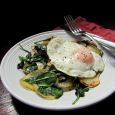
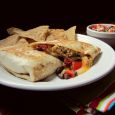

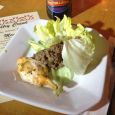



Comments